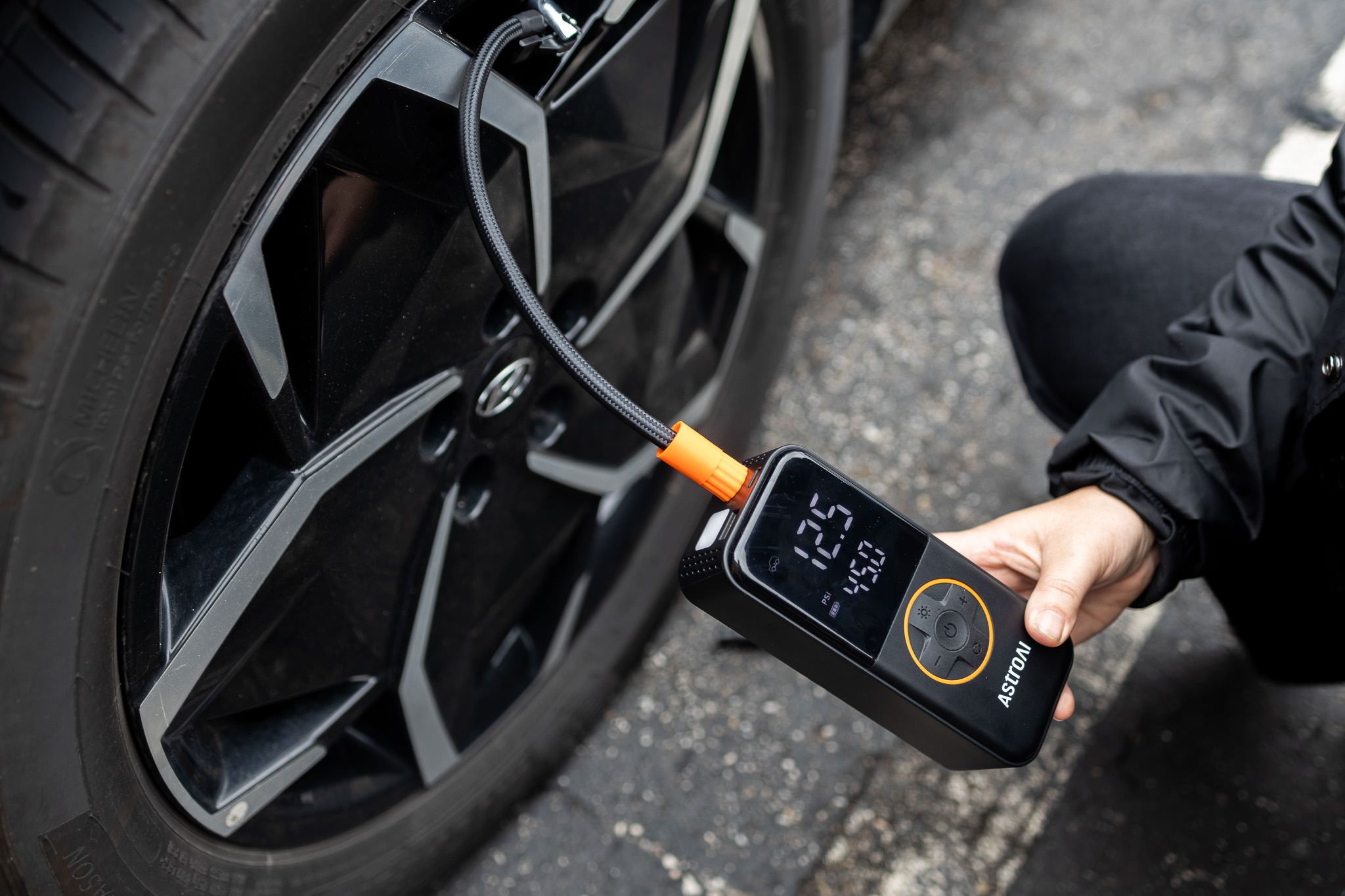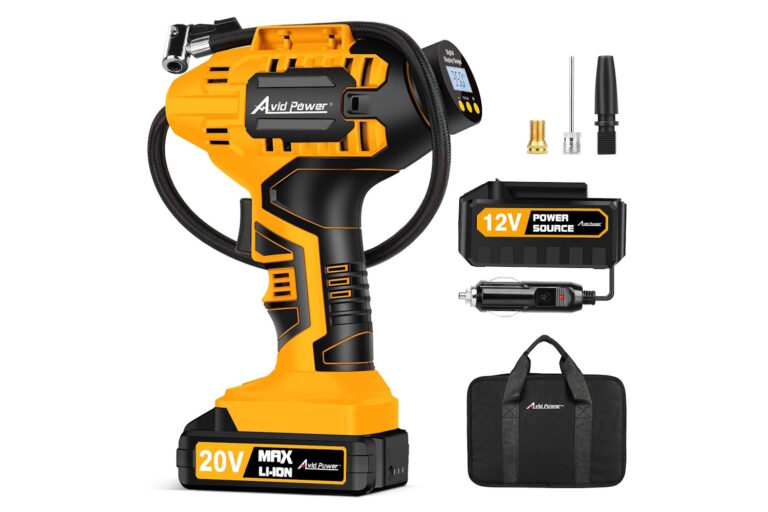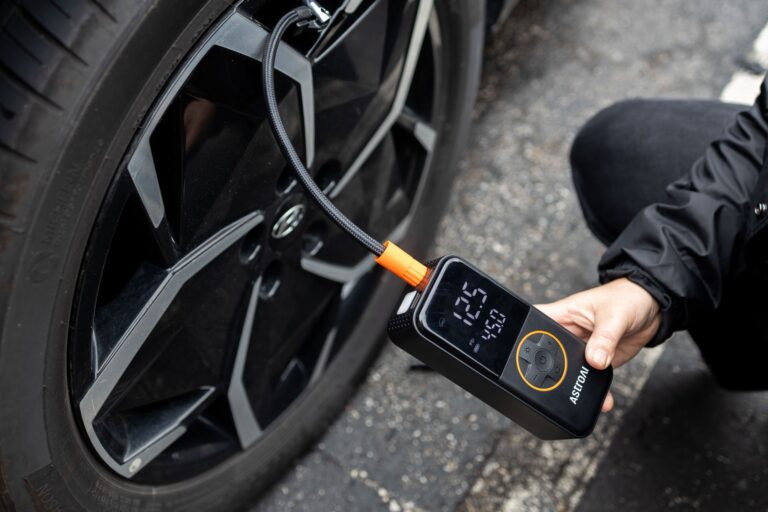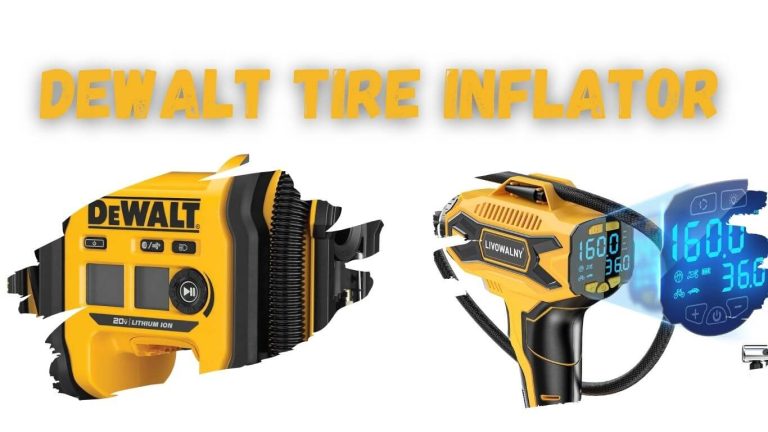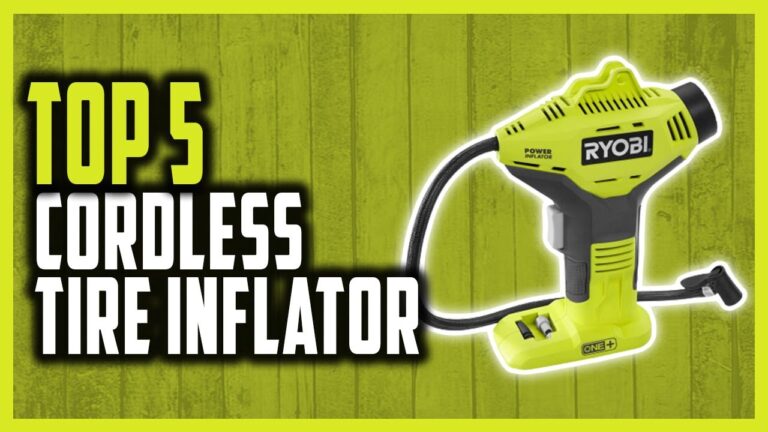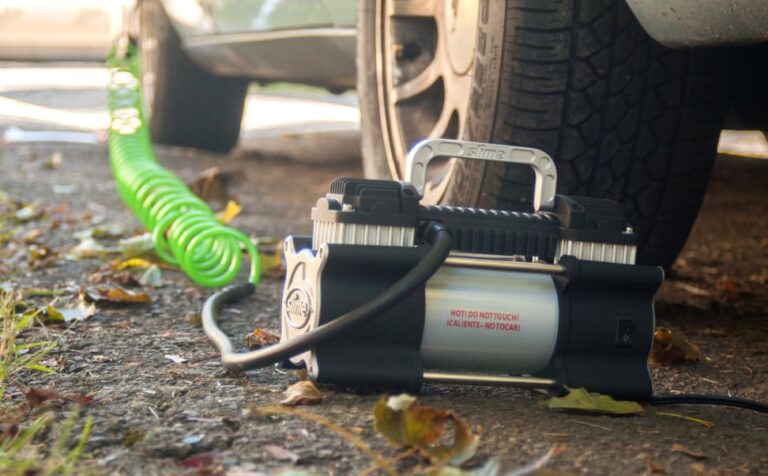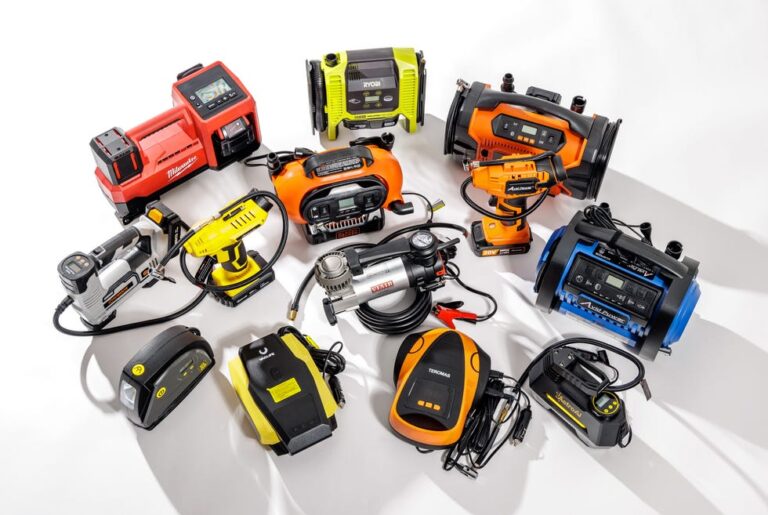The Best Tire Inflators: Boost Safety & Efficiency!
Finding the right tire inflator can make a big difference. A good inflator ensures you keep your tires properly inflated and safe on the road.
Flat tires can happen to anyone, and being prepared is key. Tire inflators are handy tools that help you fill tires quickly and easily. They come in different sizes and types, from portable models for your car to heavy-duty options for larger vehicles.
Choosing the best tire inflator means considering features like speed, size, and power. With so many options available, it’s important to know what to look for. In this guide, we’ll explore the best tire inflators on the market. This will help you make an informed choice and stay safe on your travels.

Introduction To Tire Inflators
Tire inflators are essential tools for vehicle owners. They help keep tires properly inflated. A well-inflated tire improves vehicle performance. It also extends tire life. Understanding tire inflators is crucial for every driver.
Importance For Vehicle Maintenance
Regular tire maintenance is vital. Proper tire pressure ensures safety and efficiency. Here are some key points:
- Enhances fuel efficiency.
- Improves handling and stability.
- Reduces tire wear and tear.
- Prevents unexpected flat tires.
Using a tire inflator makes maintenance easy. You can check and adjust tire pressure at home. This saves time and money on trips to the gas station.
Impact On Safety And Efficiency
Maintaining the right tire pressure is crucial for safety. Under-inflated tires can cause accidents. They increase stopping distance and reduce grip. Here are some effects:
| Tire Pressure Level | Impact on Safety | Impact on Efficiency |
|---|---|---|
| Under-inflated | Higher risk of blowouts | Lower fuel economy |
| Properly inflated | Better handling and control | Optimal fuel efficiency |
| Over-inflated | Reduced traction | Uneven tire wear |
Using a tire inflator helps achieve the ideal pressure. This boosts safety and efficiency on the road.
Types Of Tire Inflators
Choosing the right tire inflator is important. Different types serve different needs. Here are the main types of tire inflators to consider.
Manual Pumps
Manual pumps are simple tools. They require physical effort to use. They are lightweight and portable. Here are some key points:
- Easy to carry in your vehicle.
- Do not need electricity or batteries.
- Great for emergencies.
Manual pumps come in two types:
- Hand pumps: Use a lever to inflate.
- Foot pumps: Use your foot to push air in.
These pumps are best for small tires, like bike tires.
Portable Air Compressors
Portable air compressors are more powerful. They use electricity to inflate tires quickly. Here are some benefits:
- Fast inflation for car tires.
- Most models come with built-in pressure gauges.
- Can inflate other items like sports balls and inflatable toys.
They are ideal for regular use. Keep one in your trunk for convenience.
12v Car Plug-in Models
12V car plug-in models are designed for vehicles. They plug into your car’s power outlet. Here are some features:
- Quick and easy to use.
- Good for roadside emergencies.
- Compact design fits in most glove compartments.
These inflators often come with extra nozzles. They work well for various inflatables.
| Type | Key Features | Best For |
|---|---|---|
| Manual Pumps | Lightweight, no power needed | Bikes, small tires |
| Portable Air Compressors | Fast, built-in gauge | Cars, regular use |
| 12V Car Plug-In Models | Easy to use, compact | Roadside emergencies |
Key Features To Consider
Choosing the right tire inflator is important. Several features can make your experience better. Here are the main factors to think about:
Pressure Gauge Accuracy
Check how accurate the pressure gauge is. An accurate gauge helps prevent over-inflation. Look for inflators that:
- Show readings in both PSI and BAR.
- Have a built-in digital display.
- Provide a manual for checking accuracy.
Some models have automatic shut-off features. This stops inflation at the set pressure. This can save you time and prevent mistakes.
Inflation Speed
Inflation speed is crucial. A fast inflator saves you time. Look for these specifications:
- Measured in liters per minute (L/min).
- Some can inflate a standard tire in just a few minutes.
Consider your needs. For regular use, a faster model is better. For occasional use, a slower model may suffice.
Power Source And Portability
How the inflator is powered matters. Common power sources include:
| Power Source | Pros | Cons |
|---|---|---|
| AC Plug | Stable power supply | Limited to wall outlets |
| DC Car Charger | Great for on-the-go | Only works in vehicles |
| Rechargeable Battery | Portable and versatile | Battery life may vary |
Portability is key for ease of use. Choose a lightweight model. Look for built-in handles or carrying cases.
Top Picks For Car Owners
Finding the right tire inflator can make a big difference for car owners. A good inflator saves time and effort. It helps maintain proper tire pressure. Here are some top picks based on performance, price, and ease of use.
Budget-friendly Choices
Many affordable tire inflators offer great performance. They are easy to carry and use. Here are some of the best budget-friendly options:
- AstroAI Digital Tire Inflator
- Price: $25
- Max Pressure: 100 PSI
- Features: LCD display, auto shut-off
- EPAuto 12V DC Portable Air Compressor
- Price: $30
- Max Pressure: 70 PSI
- Features: Built-in LED light, easy to use
High-end Models
High-end tire inflators come with advanced features. They provide faster inflation and better durability. Consider these models:
| Model | Price | Max Pressure | Special Features |
|---|---|---|---|
| Viair 88P | $70 | 120 PSI | Portable, heavy-duty |
| Makita MAC2400 | $200 | 130 PSI | Oil-lubricated, quiet operation |
User-friendly Designs
User-friendly tire inflators make inflation simple. They often have clear displays and automatic features. Check out these easy-to-use options:
- Black+Decker ASI500
- Type: Cordless
- Inflation Time: 15 minutes
- Features: Auto shut-off, built-in storage
- iGo Power 12V Air Compressor
- Type: Compact
- Inflation Time: 10 minutes
- Features: Multiple nozzles, lightweight
Motorcycle & Bicycle Tire Inflators
Motorcycle and bicycle tire inflators are essential tools for riders. They ensure your tires are always ready for the road. A good inflator saves time and effort. It also helps you avoid flat tires during your adventures. Let’s explore the best options available.
Compact And Lightweight Options
When choosing a tire inflator, size matters. Compact and lightweight inflators are easy to carry. They fit nicely in your bag or bike compartment. Here are some top choices:
- VIAIR 88P Portable Air Compressor – Weighs only 4.5 lbs. Perfect for motorcycles.
- AstroAI Portable Air Compressor – Small design. Great for bicycles.
- EPAuto 12V DC Portable Air Compressor – Lightweight and efficient. Ideal for both bikes and motorcycles.
These inflators offer convenience. They provide quick inflation without taking much space. Always check the weight and size before purchasing.
Durability For Rough Use
Durability is key for tire inflators. Riders face various weather and road conditions. A sturdy inflator lasts longer and performs better. Here are some durable options:
| Inflator Model | Material | Durability Rating |
|---|---|---|
| Slime 40001 Tire Inflator | Heavy-duty plastic | 4.5/5 |
| Black+Decker ASI500 Air Station | Rugged design | 4.7/5 |
| Bon-Aire 1000-1 Air Compressor | Metal casing | 4.8/5 |
These inflators withstand rough conditions. They are built to last. Always consider the material and design for long-term use.
Heavy-duty Tire Inflators For Trucks And Rvs
Heavy-duty tire inflators are a must for trucks and RVs. These vehicles often face unique challenges. They require strong tools to manage larger tires. A reliable inflator saves time and effort. It ensures safety on the road.
Choosing the right inflator can make a difference. Many options exist, but not all are equal. Look for power, performance, and durability. These factors matter most for heavy-duty use.
Power And Performance
Power is critical for heavy-duty tire inflators. Trucks and RVs have larger tires. They need higher PSI levels for inflation. A good inflator can reach these levels quickly.
Many inflators come with a high-output motor. This feature helps in faster inflation. Some models have built-in pressure gauges. They provide accurate readings for your tires.
Performance is also about efficiency. A top inflator should work continuously without overheating. Look for models that can handle multiple tires in one go.
Longevity And Reliability
Longevity is essential for heavy-duty tire inflators. They face tough conditions and heavy use. Durable materials ensure the inflator lasts longer.
Choose inflators with a solid build. Metal components often outlast plastic ones. Reliable brands offer warranties, showing their confidence in the product.
Regular maintenance can extend the life of your inflator. Keep it clean and store it properly. A reliable inflator is an investment in safety and convenience.
Smart Tire Inflators: A New Age Solution
Smart tire inflators are changing how we maintain tire pressure. These devices combine technology with convenience. They help drivers inflate tires quickly and easily. No more guessing tire pressure or using manual pumps.
Digital Integration
Digital integration is a key feature of smart tire inflators. Many models come with built-in screens. These screens show real-time tire pressure readings. This makes it easy to monitor your tires.
Some inflators even connect to your smartphone. They use apps to provide detailed information. This can include historical pressure data and reminders for maintenance. The result is a safer and more informed driving experience.
Automatic Cut-off Feature
The automatic cut-off feature is another important benefit. It prevents over-inflation. Once the desired pressure is reached, the inflator stops automatically. This feature saves time and protects your tires.
Here are some key advantages of the automatic cut-off:
- Prevents tire damage
- Saves energy
- Ensures consistent pressure
Smart tire inflators make tire care simple. They combine technology with ease of use. Drivers can trust these tools for their tire maintenance needs.

Maintenance And Care Tips
Keeping your tire inflator in good shape is important. Proper maintenance ensures it works well when you need it. Follow these tips for regular care and storage.
Regular Check-ups
Check your tire inflator often. Look for any signs of wear or damage. Make sure all parts are secure. Test the inflator to see if it works properly.
Inspect the power cord and hose. Replace any frayed or damaged parts. Clean the nozzle to prevent blockages. Regular check-ups can extend the life of your inflator.
Storage Best Practices
Store your tire inflator in a dry place. Avoid areas with extreme temperatures. A cool, dry spot helps prevent damage.
Keep it in its original case or a protective bag. This keeps dust and dirt away. Ensure the hose is not twisted or pinched during storage. Proper storage makes it easy to find and use.
Troubleshooting Common Issues
Sometimes, your tire inflator may not work as expected. If it won’t turn on, check the power source. Make sure it’s plugged in or charged.
If the inflator is noisy, look for loose parts. Tighten any screws or connections. For slow inflation, check the hose for blockages. Clear any dirt or debris.
Understanding these issues helps you fix them quickly. Regular care can prevent many problems. Your tire inflator will last longer with proper maintenance.
Diy Vs. Professional Inflators
Choosing between DIY tire inflators and professional services can be tough. Each option has its own benefits. DIY inflators offer convenience. Professional services provide expertise. Understanding both can help you make the best choice.
Cost Comparison
DIY tire inflators usually cost less upfront. Prices range from $20 to $100. They are a one-time purchase. You can use them multiple times.
Professional services can be more expensive. Many shops charge around $10 to $30 per inflation. Frequent visits can add up quickly. It’s important to consider how often you need to inflate your tires.
Ease Of Use
DIY inflators are easy to use. Most come with clear instructions. You can inflate your tires at home or on the road.
Professional services may require you to drive to a shop. This takes time. You may also have to wait for service. DIY options offer flexibility and save time.
When To Seek Professional Help
Some situations call for professional help. If your tire has a puncture, DIY inflators won’t fix it. Serious damage needs expert attention.
Another reason is lack of experience. If you feel unsure about inflating tires, seek help. Professionals can ensure your tires are safe and properly inflated.

Innovations In Tire Inflation Technology
New technology is changing how we inflate tires. Traditional pumps are being replaced by smarter, more efficient models. These innovations save time and energy. They also make tire maintenance easier for everyone.
Let’s explore some exciting advancements. Eco-friendly models lead the way. Solar-powered inflators are gaining popularity. Future trends promise even more improvements.
Eco-friendly Models
Eco-friendly tire inflators use less energy. Some run on rechargeable batteries. Others use manual pumps. These options reduce waste and carbon footprints. Users can inflate tires without harming the environment.
Many of these models are lightweight and portable. This makes them easy to store and transport. They also offer efficient performance, ensuring tires stay properly inflated.
Solar-powered Inflators
Solar-powered inflators are a new trend. They harness energy from the sun. This makes them ideal for outdoor use. Campers and road-trippers benefit from these devices.
With solar power, users can inflate tires anywhere. No need for outlets or batteries. These models are eco-friendly and cost-effective. They help users save money on power costs.
Future Trends
The future of tire inflation looks bright. Smart technology will play a big role. Inflators may connect to mobile apps. This can help track tire pressure easily.
Automated inflators may become common. They will adjust pressure without user input. Safety features may also improve. These innovations will make tire care simpler and safer.
Conclusion: Making The Right Choice
Choosing the best tire inflator can be simple. Focus on your needs. Consider size, power, and features. A good inflator can save you time and stress. Let’s summarize the key points to help you decide.
Summarizing Key Takeaways
Here are the main points to remember:
- Portability: Look for lightweight models.
- Power Source: Decide between plug-in or battery-operated.
- Pressure Gauge: An accurate gauge helps avoid over-inflation.
- Speed: Check how quickly it inflates tires.
- Durability: Choose robust materials for long-lasting use.
Final Recommendations
Based on our research, here are a few top picks:
| Model | Portability | Power Source | Price |
|---|---|---|---|
| Model A | Lightweight | Battery | $50 |
| Model B | Compact | Plug-in | $40 |
| Model C | Portable | Both | $70 |
Choose a model that fits your lifestyle. Consider how often you drive. Think about the types of tires you have. Invest in a tire inflator that meets your needs.
Frequently Asked Questions
What Should I Look For In A Tire Inflator?
When choosing a tire inflator, consider the inflator’s PSI rating, portability, and power source. Look for features like automatic shut-off, built-in pressure gauge, and a bright LED light for nighttime use. Ensure it’s compatible with your vehicle’s tire valve and has a sufficient hose length for convenience.
How Do I Use A Tire Inflator Correctly?
To use a tire inflator, start by checking the recommended PSI for your tire. Connect the inflator to the tire valve and turn it on. Monitor the pressure gauge, and once the desired PSI is reached, turn off the inflator.
Finally, remove the nozzle and ensure the valve is securely closed.
Can I Inflate Any Tire With A Tire Inflator?
Most tire inflators can inflate standard car, motorcycle, and bicycle tires. However, check the inflator’s specifications for compatibility with larger tires, such as those on trucks or RVs. Some inflators may require additional attachments for different valve types, so ensure you have the right accessories on hand.
How Long Does It Take To Inflate A Tire?
Inflating a tire typically takes 5 to 10 minutes, depending on the inflator’s power and the tire’s size. Portable inflators may take longer than high-capacity models. Always monitor the pressure to avoid over-inflation and ensure safety while inflating your tires.
Conclusion
Choosing the right tire inflator is essential. A good inflator saves time and stress. It ensures your tires stay safe and properly inflated. Remember to consider size, speed, and ease of use. Each of the inflators listed has unique features to suit different needs.
Take time to pick the best one for you. A reliable tire inflator is a smart investment. It can help you stay safe on the road. Make the right choice today for peace of mind tomorrow. Your tires will thank you.

